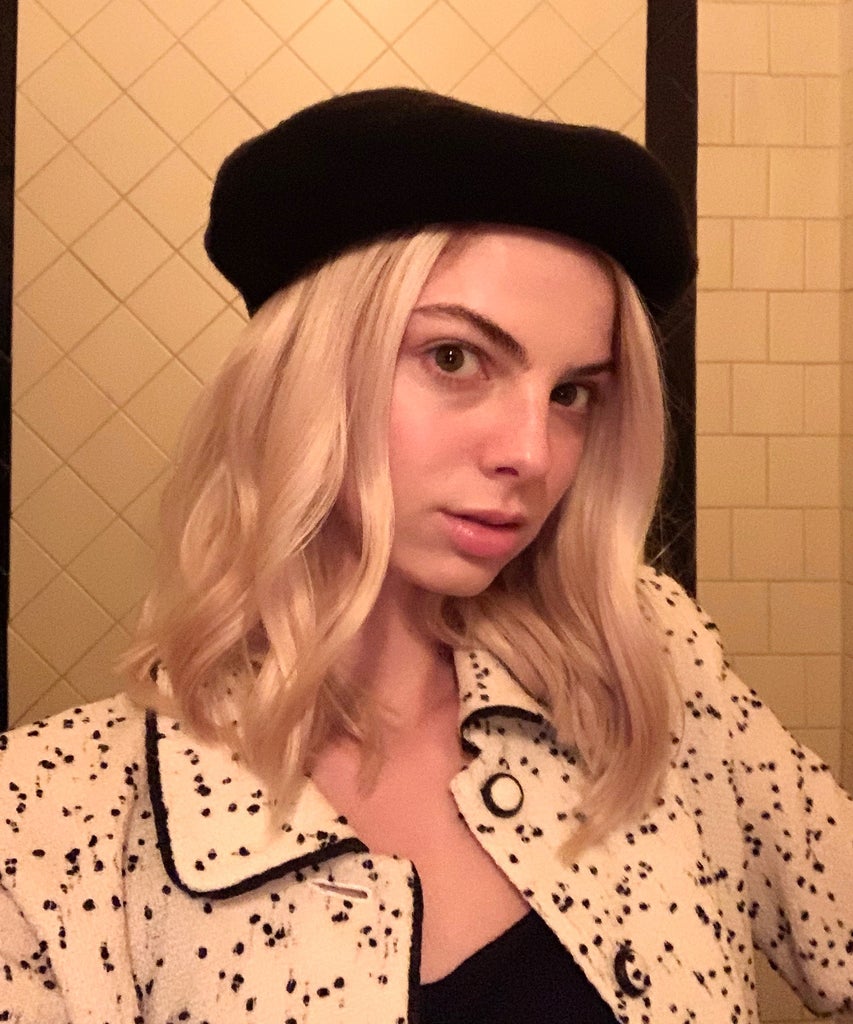#DMTBeautySpot #beauty

“It’s 1:30 am. I’m very, very tired. Is this a bad idea? Absolutely. It’s a horrible idea,” says actress Allie Evans while holding up a pair of clippers. “But if there’s any time to fuck around with your hair, it’s right now.”
Like many of us confined to our homes during the COVID-19 pandemic, Evans suddenly felt compelled to cut her own hair last Tuesday — and she documented the entire process on Instagram Stories. When the clippers didn’t work, Evans reached for a pair of blunt kitchen shears and, within a matter of minutes, took her hair from a clavicle-skimming lob to a blunt bob that hits right at her ears.
“This is 100% a compulsive thing for me,” she says to me over the phone from her home in Los Angeles. “We’re in a state where we have absolutely no control of anything, and it can be comforting to try and control the one thing that you can… which is how I look and present myself.”
Evan’s rationale is spot-on. “When all else in the world feels so out of our control, one way to retain some is to control what we can,” says Dr. Vivian Diller, psychologist and author of Face It: What Women Really Feel as Their Looks Change. “Organizing our closets or cutting our hair can serve that purpose.”

While countless memes and posts credit outgrown layers and split ends as the impetus to wield scissors after months of salon closures, there are deeper reasons behind the sudden influx of #quarantinecuts. The truth is, many people — whether they know it or not — are seeking more than a simple trim. From claiming control and processing trauma to engaging in playful experimentation or chasing the thrill of a “rebellious” act, there are multiple emotional and psychological triggers that prompt someone to make such a spontaneous change.
Take Meghan Montaner, for example. The director of education for a performing arts theater in Northborough, Massachusetts chopped more than six inches off her hair in a spur-of-the-moment cut a few weeks back. “It was just a couple days before my birthday and I was tired of feeling cooped up,” she says. “My husband had gone out to run an errand, I had gotten my son to bed and I had 30 minutes to myself. I took a shower, put a sheet on the floor, grabbed the scissors, and that was that.”
Montaner says the cut came, in part, from a desire to break up the monotony of life under quarantine, which Dr. Diller says is a common response to experiencing a long period of isolation. But Montaner’s move paid off in other ways: not only was she pleasantly surprised by the final look (“My hair looks better now,” she says), but she’s also riding a high of accomplishment from successfully pulling off something she’s never done before. “I think it was surprising what a positive experience it was for me to cut my hair and how much better I felt in that moment,” Montaner says. “It’s kind of liberating in a way because I was able to do something, affect something, change something.”
Making a change like cutting your hair can feel good because you’re taking action. When you take action, there’s a feeling of accomplishment.
PSYCHOLOGIST Suzanne Deggs-White
For a generation that has become increasingly dependent on outsourcing everything — from assembling Ikea furniture to prepping meals — the exhilaration that comes from doing something for yourself can be revelatory. Dr. Suzanne Deggs-White, a psychologist, professor, and chair of the department of counseling and higher education at Northern Illinois University, says that taking on tactile projects, like cutting your own hair, can tap a joy that might be lacking in quarantine. “Trauma and crisis stop us from feeling much more than the scary feelings for a while,” she says. “Making a change like cutting your hair can feel good because you’re taking action. When you take action, there’s a feeling of accomplishment. If you change your hair and it feels good, there’s a payoff — a freeing feeling that’s like having agency in the world.”

Reclaiming agency during a chaotic time is part of what motivated Janeese Castelar’s off-the-cuff decision to shave her head two weeks into quarantine. “My hair is really curly and if it’s not maintained, it’s just going to get wild. But most of [why I shaved my head] was because I wasn’t sure of what was going to happen when COVID-19 hit,” says Castelar, the head piercer for Stone & Strand and a multimedia artist living in New York City. “ I felt like, I don’t know what’s going to happen, but now is not the time to be soft.”
Changing our hairstyle to channel a new attitude isn’t exactly novel; pop stars do it all the time (see: Miley’s mullett). But when the stakes feel higher than, say, boosting digital downloads, the effect can be particularly potent. For Castelar, losing her soft curls brought on a huge shift in energy. “Before, if people were coming to me for a piercing or even just a conversation, I felt my purpose was to bring this closeness and togetherness and light. Now, we need to be there for each other, but in order to do it, we need to be alone and that’s a kind of toughness that we didn’t need before,” she says. “I need to be stronger, and I feel like getting rid of the hair really helped that.”
I need to be stronger, and I feel like getting rid of the hair really helped that.
Janeese Castelar, Piercer In New York City
For Castelar and Evans, a spirit of disruption also fueled their home cuts. Evans says she’d rather deal with the fallout from her talent management team than ask for permission to change her hair, while Castelar cites a cultural beauty standard for women that’s so intertwined with long hair; for her, buzzing it short felt like a dare. Dismissing convention can also prompt a dopamine hit, according to Dr. Deggs-White. “Breaking the rules a little bit always feels good,” she says. “There’s a rush you get when you do something unexpected — a new pathway is forging in your old neurons in the brain.”

Whether triggered by a sense of play, a need for security, or a desire to break up the monotony of life at home, cutting our own hair is, at its core, a form of self-expression that can signal an emotional release. “It’s emotionally exhausting to bear the weight of COVID-19,” Dr. Deggs-White recognizes. “There’s something out there that we can’t even see — especially for those who don’t know someone who has been diagnosed with or who has lost a life from the virus. It’s still got its grip on us; we’re still under pressure.”
While this pandemic has amplified the psychological drivers connected to why we cut our hair, they aren’t exactly new. “We know that during major life transitions — marriages, moves, illnesses, losses — women sometimes define these times with a change in their appearance,” Dr. Diller points out. “It’s possible that cutting hair or changing styles during COVID is a way for women to use their appearance to make a statement marking this world event.”
It’s an idea not lost on Castelar. “I feel like a lot of people are cutting their hair now as a way of saying, ‘Let’s start from here and move forward,’ because there really is no going back to the way that it was. We’re not going to go back to normal — and I don’t think we should.”
Like what you see? How about some more R29 goodness, right here?
DMTBeautySpot
via https://www.DMTBeautySpot.com
Erika Stalder, Khareem Sudlow

0 comments